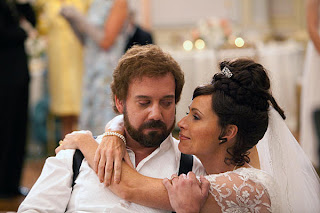 The film is in fact based on a novel by Mordecai Richler. Our story opens with Giamatti’s character – Barney – as a sixty-something drunk crank calling his ex wife. His ex’s husband answers the phone and Barney teases him mercilessly. Next morning, Barney’s daughter shows up to gently reprimand him since Blair – the new husband – has had a heart attack. Barney laughs at this and takes some perverse pleasure.
The film is in fact based on a novel by Mordecai Richler. Our story opens with Giamatti’s character – Barney – as a sixty-something drunk crank calling his ex wife. His ex’s husband answers the phone and Barney teases him mercilessly. Next morning, Barney’s daughter shows up to gently reprimand him since Blair – the new husband – has had a heart attack. Barney laughs at this and takes some perverse pleasure.But the movie then quickly moves into the past – into a flashback that becomes the long sequence of Barney’s life leading up to this point – and we find that he wasn’t always a crank. As a young man living in Rome in 1974, Barney’s a serious but fun-loving writer hanging with three male artist friends and a woman whom he has gotten pregnant and promises to marry. The movie then proceeds to tell the story of this marriage, Barnie’s friends, then his next marriage (to the Montreal equivalent of a “JAP” or Jew American Princess – a JCP I suppose but that’s harder to pronounce), and finally, the marriage to the love of his life, a woman that he meets at his second wedding and proceeds to chase down over the course of his JAPPY marriage.
What I love about this movie is how right it gets its time and culture. The Eighties wedding to his second wife (played with perfect pitch by Minnie Driver) is lifted right out of photo albums I’ve got of growing up in a Jewish Midwestern home in this period. Even the tuxes have the right powdery blue and the band plays the right mix of Haava Nageela and elevator music. Barney’s family tsoris is all pitch perfect too: his father, an ex police-man, is the right type of loud, blue-collar Jew that can’t take the condescension from Barney’s wealthy, showily religious father-in-law.
Barney clearly loves his father as well (played with wonderful chutzpa by Dustin Hoffman), and as the story goes on, the movie deftly uncovers the emotions between fathers and sons (I related deeply to the scene where Barney discovers his father has died). What the film does better than anything is use the rhythms of Barney’s life to create gentle rhymes – such as when Barney’s own son goes through his angst and then caring for him as he goes senile; or when Barney realizes, at the very end of his life, what one of his young friends meant when he said he’d rather die early but spectacularly (in this scene near the end of his life, Barney has had dementia for a while, but upon hearing that his friend…whom everyone had thought had drowned in the river…had actually suffered from what looks like “injuries from a sky-diving accident,” he becomes lucid enough to realize what had actually happened all those years ago).
The movie covers a lot of time and it does so well. Occasionally it does lapse into the uncannily literary and compress what’s a lifetime of emotion into a few short scenes – for heightened metaphorical effect. That’s to be forgiven given that the ambition of the film is really to encapsulate a life, and it does so with marvelous feeling and recognition. It also captures well the progress of time and culture, and the evolution of a Midwestern Jewish enclave from transplanted tradition into a modern, integrated society.
I could not end this review if I also didn’t talk about Barney’s great love – his third wife (played by Bond villainess Rosemund Pike) – whom he courts with all irrationality. This great love of Barney’s life goes well for a while, but like all things, it does not last. Giamatti brings a marvelous comic tone to these antics, at times on the edge of hysteria or mania, but always showing his heart on his sleeve. In some ways the movie really reminds me of The World According to Garp - perhaps the title is even a bit of Jewish homage to that much more white-bread version. As in Garp, the other characters provide humorous and doleful context and life lessons for our flawed hero. As Barney loses his memory in the end, he begins to lose as well his touch with all the things that have gone wrong, until he is left with a fantasy, the core of his love, and no grasp left on reality. This focus on memory, dementia, and regret makes this movie also a study about nostalgia and the role of memories in shaping our lives.
As I get older, I appreciate this theme of nostalgia and memory more and more. To be honest, I found this movie hard to forget, even days later. There’s nothing remarkable, really, about Barney’s life, other than that he is one of us, and he lived it. But in examining the ordinary life, Barney’s Version tells us a lot about our own. This movie has won numerous awards, and may sound like something esoteric and maybe even a little serious. But it’s really quite fun, and oddly unforgettable.








